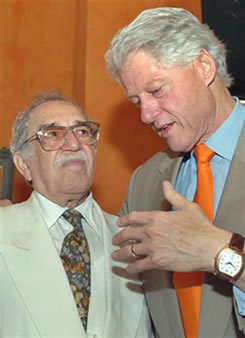Colombia
honors writer Garcia Marquez |
By
FRANK BAJAK -- Associated Press Writer CARTAGENA, Colombia (AP) Gabriel Garcia Marquez delighted his language's guardians - as well as a king and eight current and former presidents - with a classic story about being a starving writer: how he managed to finish what many consider the greatest novel in Spanish since "Don Quixote."
"I believe he's the most important writer of fiction in any language since William Faulkner died," said Clinton, who recalled reading "One Hundred Years" in 1972 when he was in law school and not being able to put it down - not even during classes. "I realized this man had imagined something that seemed like a fantasy but was profoundly true and profoundly wise," Clinton told The Associated Press in a brief interview. Clinton first met the author in 1994. Fellow writers Carlos Fuentes of Mexico and Tomas Eloy Martinez of Argentina praised the longtime friend they affectionately know as "Gabo" for breathing life into and remaking a language now spoken by nearly 500 million people - the official tongue of 21 nations and the fourth most popular after Chinese, English and Hindi. "One Hundred Years" is the first novel in which Latin Americans recognized themselves, that defined them, celebrated their passion, their intensity, their spirituality and superstition, their grand propensity for failure, said Gerald Martin, a University of Pittsburgh professor who is working on a biography of Garcia Marquez. "Only time will tell if he's as important to Spanish literature as Cervantes," he said. "We may have to wait 500 years to find out." The special annotated edition of "One Hundred Years" that went on sale Monday is only the second such volume produced by the Royal Academy after "Don Quixote," which Miguel de Cervantes published in two parts, in 1605 and 1615. Garcia Marquez recalled how, when his masterwork was finally finished in August 1967 and he and his wife went to the post office to send it to his editor in Buenos Aires, they only had a little more than half the required postage. So they split the manuscript into two and sent half of it. "Afterward, we realized that we had sent not the first but the second part," he said. Luckily, editor Paco Porrua "was so eager to read the first half that he forwarded us the money so we could send the rest." |
